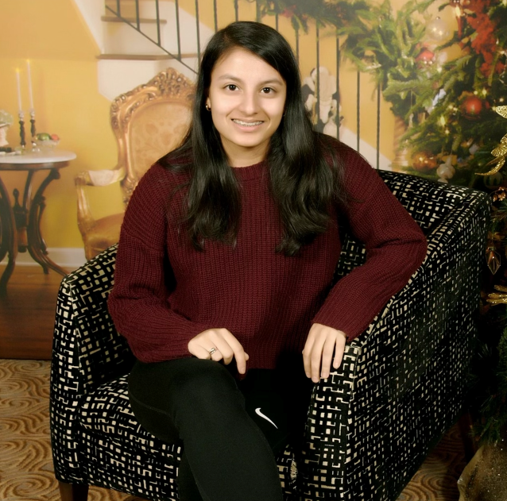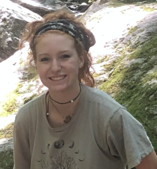The North Carolina International Science Challenge (NCISC) is a high school STEM competition that crowns a select group of talented students to represent their schools (and their nation) in the Beijing Youth Science Creation Competition every spring. While this past year posed unique challenges for these students and, while the event was held virtually instead of in China, these students were not hindered by their limitations. Rather, they rose to the challenge of researching and collaborating from afar.
Let’s meet some of these terrific young minds on their road to NCISC success!
Esha Agarwal
Junior at Enloe High School
 Esha began her STEM journey as an early and avid reader when she discovered “The Magic Tree House” series, a set of books that both lit her imagination and introduced her to the scientific method. Following quickly on the heels of this discovery, she participated in her first science fair in fourth grade—a rooftop solar energy project inspired by the movements of sunflowers—and today she is ready to participate in NCISC with her topic “A Smartphone Monitoring App for Bradykinesia, Rigidity, and Tremor Designed to Remotely Assess Parkinson’s Disease.”
Esha began her STEM journey as an early and avid reader when she discovered “The Magic Tree House” series, a set of books that both lit her imagination and introduced her to the scientific method. Following quickly on the heels of this discovery, she participated in her first science fair in fourth grade—a rooftop solar energy project inspired by the movements of sunflowers—and today she is ready to participate in NCISC with her topic “A Smartphone Monitoring App for Bradykinesia, Rigidity, and Tremor Designed to Remotely Assess Parkinson’s Disease.”
While some of her peers found challenges resulting from COVID, Esha’s project was actually driven by it. She began studying Parkinson’s disease when her grandfather was diagnosed, and when COVID struck, she became acutely aware of the need for strides in telemedicine. She developed the OutSMARTPD app to help elderly patients, who can’t travel safely, better communicate their symptoms with their doctors, and to provide more objective diagnostics to, as Esha says, “Promote patient empowerment and self-monitoring/active participation in care.”
The only junior in this year’s group, Esha continues to take AP math and science courses at Enloe High School and notes that she has found tremendous support from her teachers and science fair mentors. She continues her Parkinson’s research and hopes to pursue a career in healthcare, possibly earning an MD-PhD, feeding her passions in both medicine and research.
Melissa Du
Senior at NC School of Science and Math
 Like many inquisitive minds, Melissa Du attributes her early interest in the sciences to one special teacher, Mr. Robert Bedell, her 7th grade Life Sciences teacher. What drove her classmates crazy—heavy workloads, a fast pace, and difficult tests—actually drove Melissa’s passion for learning, specifically her fascination with anatomy and physiology following her first peek at microorganisms under a microscope. When this same teacher recommended Melissa for her very first Science Olympiad, her interest in human systems was ignited further. “I was astonished to learn that the term ‘hormone’ wasn’t solely confined to the context of moody teenagers!”
Like many inquisitive minds, Melissa Du attributes her early interest in the sciences to one special teacher, Mr. Robert Bedell, her 7th grade Life Sciences teacher. What drove her classmates crazy—heavy workloads, a fast pace, and difficult tests—actually drove Melissa’s passion for learning, specifically her fascination with anatomy and physiology following her first peek at microorganisms under a microscope. When this same teacher recommended Melissa for her very first Science Olympiad, her interest in human systems was ignited further. “I was astonished to learn that the term ‘hormone’ wasn’t solely confined to the context of moody teenagers!”
As with several of her colleagues, COVID’s restrictions actually drove Melissa’s research project, “A Versatile Stochastic Population Dynamics Model of Antibiotic Resistance, Tolerance, and Persistence.” While she has done lab work before, she was forced to take a more computational approach and found these models more versatile and efficient. She discovered that while a number of studies in the literature examined some combination of antibiotic resistance, tolerance, and persistence, none covered all three, so she decided this was how she should approach her project. When describing her research process, she notes, “It’s quite beautiful to recreate the essence of nature from man-made constructs, like code and math, and I’m continuously amazed by the rapid advancements made in Computer Science and the elaborate complexity of the field.”
Melissa continues to meet with her Research and Biology class at NC School of Science and Math (NCSSM) along with her instructor and mentor, Dr. Amy Sheck and finds both the hands-on research and thoughtful feedback from her classmates critical to her successes. She hopes to study Neuroscience or Computer Science in college and encourages future STEM students to “Always be open to learning new things because you never know what you might be fascinated by.”
Om Nerurkar
Senior at NC School of Science and Math
 While Om can’t pinpoint the genesis for his love of math and science, he does remember being very young and making the connection between centripetal force and a spinning merry-go-round! Since then, he’s become an accomplished researcher, an aspiring scientist, and a dedicated communicator (in spite of—and perhaps because of—COVID’s impact on him and his colleagues). He attributes both his inquisitive nature and his continued commitment to “thinking computationally” to NCSSM, his Research in Computational Science teacher, Mr. Gotwals, and his mentor, Dr. Panoff of the Shodor Foundation.
While Om can’t pinpoint the genesis for his love of math and science, he does remember being very young and making the connection between centripetal force and a spinning merry-go-round! Since then, he’s become an accomplished researcher, an aspiring scientist, and a dedicated communicator (in spite of—and perhaps because of—COVID’s impact on him and his colleagues). He attributes both his inquisitive nature and his continued commitment to “thinking computationally” to NCSSM, his Research in Computational Science teacher, Mr. Gotwals, and his mentor, Dr. Panoff of the Shodor Foundation.
While Om’s topic, “Estimating the Effects of Ocean Acidification on the Shellfish Industry: A Case Study in South Puget Sound,” seems nearly impossible to complete from the East Coast, Om insists that the geographic limitations and COVID’s restrictions changed his research strategy some but also encouraged him to reach out to peers and experts in ways he might otherwise not have. What began as pure experimentation evolved into the development of relationships with mentors, a campaign to build awareness about fossil fuel emissions’ effects on coastal communities, and—even closer to home—studying how the acidity in the Pacific could impact seafood in India, where Om’s extended family lives.
“I think it’s super important that we find ways to connect with each other in these trying times,” Om says, as he discusses his fruitful contact with peers, mentors, and even young researchers through opportunities like the State of NC Undergraduate Research & Creativity Symposium and Citizens Climate Lobby. While Om hasn’t settled on a future path yet, he loves climatology because it combines fluid dynamics, physics, chemistry, biology, and even socioeconomics and culture. He says, “As long as I’m solving problems, I’ll be having fun!”
Kayla Ruff
Sophomore at Hickory High School
 Like many of her fellow competitors, sophomore Kayla Ruff found her way to STEM studies very organically and early. It helped that her dad is a biology teacher, but she recalls spending a lot of time outdoors, exploring and reveling in both the natural environment and the animals she learned about. When she discovered that she could study these ecosystems and work hard to preserve the animals she was so passionate about for a living, she was hooked.
Like many of her fellow competitors, sophomore Kayla Ruff found her way to STEM studies very organically and early. It helped that her dad is a biology teacher, but she recalls spending a lot of time outdoors, exploring and reveling in both the natural environment and the animals she learned about. When she discovered that she could study these ecosystems and work hard to preserve the animals she was so passionate about for a living, she was hooked.
Not surprisingly, Kayla’s project was the result of a discovery she made while exploring in her own backyard. “Determining the Ecological Impacts of the Invasive Land Planarian Bipalium Kewense: An Analysis of Predatory Behavior and Reproductive Potential” examines this strange creature and its potentially dangerous impacts to North Carolina’s ecosystem. Not hard to imagine, Kayla suggests, when you learn that if you cut the creature into pieces, each piece is capable of growing a new head!
Since Kayla hails from rural Hickory, she is particularly thankful for her experiences with science fairs in general and the NCISC in particular. She points to challenges in finding resources, mentors, and opportunities where she is but stresses that young people—especially girls—from rural communities should strive to pave their way in STEM fields. If there are no clubs, start one. No experts in your field at your school? Reach out on-line. “My advice to young girls,” she says, “would be to never let societal stereotypes interfere with your passion for STEM. People who follow their passions instead of stereotypes are ultimately the people who will make a difference in the world.”
Andrew Zhen
Senior at NC School of Science and Math
 Andrew Zhen describes his entrée into the world of STEM as just following the numbers. Even from his time in elementary school, he recalls blowing through math tests and having a real affinity for computation. When he realized he could apply his love of numbers to real world problems through science, his course was set.
Andrew Zhen describes his entrée into the world of STEM as just following the numbers. Even from his time in elementary school, he recalls blowing through math tests and having a real affinity for computation. When he realized he could apply his love of numbers to real world problems through science, his course was set.
Andrew’s project, “Disentangling the Spatiotemporal Heterogeneity of Alzheimer’s Disease Using a Novel Deep Predictive Clustering Network” is the result of pure mathematics and a heartwarming personal experience colliding. Andrew plays the piano for residents at nursing homes in his community so he has seen first-hand the devastating effects neurological disorders have on people—but also the soothing power music can have on them. His project, then, allowed him to use his computational skills to get to the root of the problem and crunch data he collected and provide comfort at the same time.
As a senior at the NCSSM, Andrew notes that his time among an “uber-talented and diverse student body” has encouraged him to dream bigger and “accept the greater challenge.” He feels compelled to not just study but to excel for himself but also his peers and those in his community. His one piece of advice for the next generation of STEM students: “Don’t do science for the sake of anything other than enjoying it.”
Congratualtions to all the finalists for a job well done, and wish everyone a great start to a young and promising STEM career!
Good story. These competitions are daunting to some, but inspiring for others and motivating to continue to learn STEM content and processes, which eventually serve all of us! Charles
Congratulations to this year’s NCISC recipients on the creative and insightful research in which you are engaged! I really appreciate how your inquiry is driven by your personal experiences and passions. Keep up the great work and best wishes for a successful year in 2022